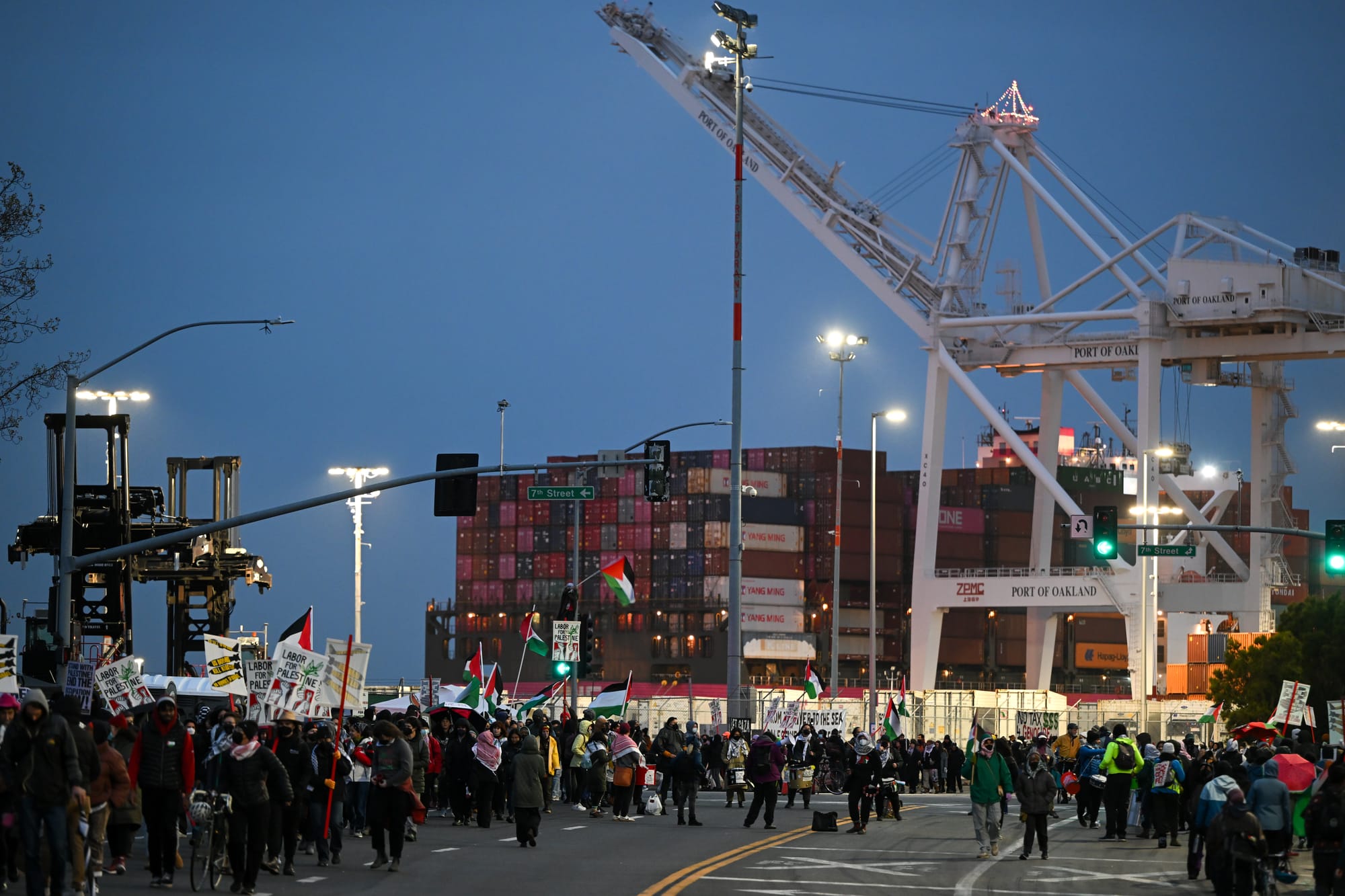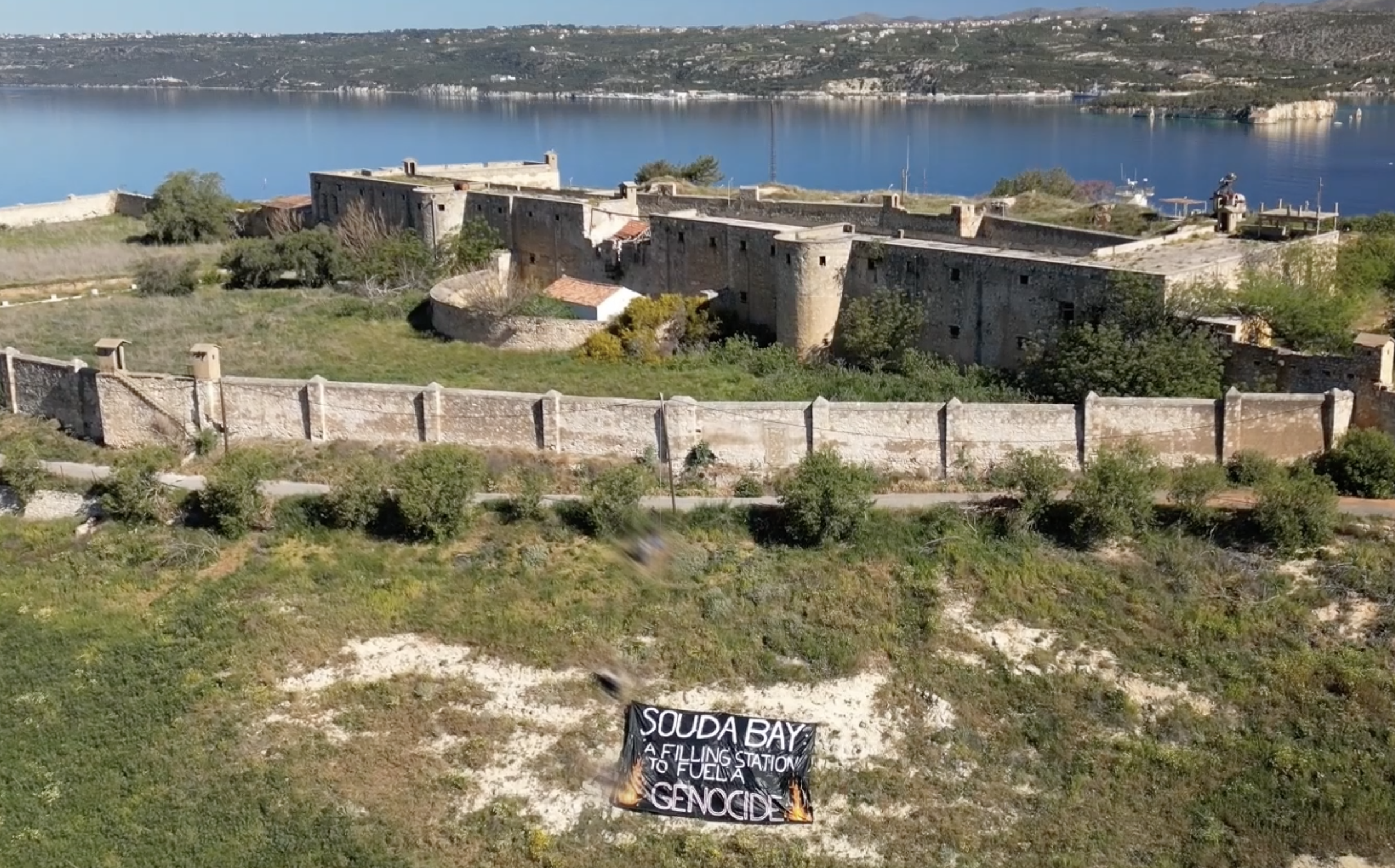Routes to Disruption—Supply Chain Sabotage and Israel's War on Gaza



Since October 7, at least three shipments of military-grade jet fuel (JP-8) have reached Israel from the United States, powering the fighter jets and Apache helicopters that have, for more than nine months now, continued to decimate Gaza.

Each shipment carried 30,000 barrels of fuel—enough to refuel a fighter jet 12,000 times. The shipments were part of a $3 billion contract issued by the US Defense Logistics Energy Agency in 2020 for 1 billion liters of JP-8 fuel, covering several years of supply to Israel. In March of this year, an investigative report by Oil Change International and DataDesk found the holder of the contract was Valero Energy, a US corporation with 15 oil refineries worldwide and a top supplier of jet fuel and diesel to the US military. The report traced the fuel’s transport routes from Valero Energy’s refinery in Corpus Christi, Texas, across the Atlantic, through Gibraltar, Crete, Sicily and Cyprus, before finally docking at the Ashkelon oil terminal in Israel. The tankers it was shipped on fly the US flag, effectively making them extensions of US sovereignty at sea.
JP-8 is the military equivalent of civilian jet fuel, with corrosion inhibitors and anti-icing additives. It is produced by oil and gas companies through a specific refinement process. Not all states have refineries capable of producing it, although Israel does: In 2022 alone, two refineries located in Haifa Bay and Ashdod produced 1.248 million tons of jet fuel. But despite this capacity, Israel still depends on US-based oil and gas companies, like Valero Energy and (in the past) Exxon Mobil, for its primary supply of jet fuel.
Indeed, supply chain sabotage and worker blockades have historically created strategic chokepoints in the flow of material, capital and people that sustain repressive regimes and imperial projects.
Israel’s dependency on JP-8 imports renders transnational fuel shipments an obvious point of leverage against the Israeli war machine. Indeed, supply chain sabotage and worker blockades have historically created strategic chokepoints in the flow of material, capital and people that sustain repressive regimes and imperial projects. Popular movements against the apartheid regime in South Africa, for instance, frequently targeted energy corporations and infrastructure. Following the 1970s oil sanctions by countries of the Global South, the South African apartheid government turned to oil companies like British Petroleum and Shell to maintain their oil imports. In response, the Anti-Apartheid Movement targeted Shell garages with pickets, petrol stations with blockades and Shell general shareholder meetings with banners demanding: “No Fuel for Apartheid.” In 1962, the San Francisco Bay Area’s longshore workers adopted a stance in solidarity with Black South Africans, refusing to unload any cargo from the country for 11 days.
Palestinian activists have learned from these tactics. In 2014 and 2021, the Block the Boat movements on the Pacific coast of the United States brought together Palestinian activists, Black Lives Matter protesters and longshoremen’s unions to blockade the Israeli shipping company Zim. Also in 2021, South African and Genovese dockworkers refused to unload Israeli Zim ships.
Moreover, the Middle East has its own rich history of disrupting imperial supply chains, especially those involving oil and its critical infrastructure. Throughout the 1960s, dockworkers in the Arabian Peninsula refused to unload cargoes that had passed through Israel. In 1965, the dismissal of hundreds of workers from the Bahrain Arab Petroleum Company (Bapco) sparked subversive acts, from blowing up oil pipelines to burning oil company buses and stoning European cars. In 2011, Bedouin activists in the Sinai torched the trans-Sinai gas pipeline, set up blockades to prevent Egyptian security forces from re-opening it and cut supplies for 45 days. Similar actions hobbled the Egyptian Natural Gas Company (GASCO) pipeline from North Sinai to Jordan and Israel over the next four years.
In Palestine, direct action against energy infrastructures has been a method of anti-colonial struggle since the mandate period. During the Arab Revolt of 1936–1939 against the British Mandate, followers of the Red Hand guerrilla group blew up sections of the Kirkuk-Haifa pipeline, which belonged to the British-owned Iraq Petroleum Company, on a regular basis. The pipeline was eventually dismantled in 1948. A prominent member of the Red Hand, Ali Khulqi, recalled the group meeting in his home in Irbid during the second world war and deciding to strike the oil pipelines and cut the telephone wires.[1] The Red Hand inspired later Palestinian groups, including guerrillas from the Popular Front for the Liberation of Palestine (PFLP), who targeted Israeli pipelines in Haifa and the Naqab (Negev), and Aramco’s Trans-Arabian Pipeline through Golan after the 1967 War.
The global fossil fuel industry cannot be abstracted from Israel’s ability to carry out its genocidal campaign, nor from ongoing and unequivocal US support for Israel.
Today’s transnational energy routes require transnational responses. The global fossil fuel industry cannot be abstracted from Israel’s ability to carry out its genocidal campaign, nor from ongoing and unequivocal US support for Israel. As Adam Hanieh has written, Israel as a settler colony has played a crucial role in maintaining US imperial interests in the Middle East.[2] US hegemony over who purchases the region’s oil, at what price and in what currency is critical to sustaining its global power—as is the maintenance of Israel as an outpost and fuel conduit. It is clear, then, that the struggle for Palestinian Liberation is a struggle for climate justice and the overhaul of fossil fuel capitalism.

The inextricable links between fossil fuels and Palestine have motivated new Palestinian-led campaigns to emerge in the wake of October 7, such as the Global Energy Embargo for Palestine, which both writers work with. The campaign argues that energy in all forms—coal, crude oil, jet fuel and gas—plays an active role in fueling Israel’s campaign of genocide and funding its settler colonial occupation of Palestine. It has called on workers, unions, climate justice and pro-Palestine groups to block and disrupt the deadly flow of energy, like military jet fuel, in and out of Israel.
On February 9, 2024, Valero Energy’s MT Overseas Sun Coast had set off from Corpus Christi, with its cargo of JP-8 jet fuel and was on its way to Ashkelon, Israel. Its Automatic Identification System did not disclose its destination on departure to avoid detection by activists. After crossing the Atlantic, it stopped in the Spanish port Algeciras, before continuing to Souda Bay, a NATO military base in Crete. The ship turned off its transponder en route, an act illegal under international maritime law. This evasion of regulations allows Israel to create a black hole of operations in European waters with full European complicity. Once alerted to the presence of a tanker carrying jet fuel to Israel, activists in Crete hurriedly planned activities against the ship. A nearby demonstration against a squat eviction and police brutality was diverted to Souda Bay where activists dropped banners decrying Souda Bay as a “filling station to fuel a genocide.”
Such mobilizations are, for now, awareness-raising efforts. Yet, they remain vital for the emergence of a broader campaign that connects activists across the transit route of jet fuel. These tactics might deviate from the strategies of pipeline sabotage advanced by activist scholars like Andreas Malm in How to Blow Up a Pipeline (Verso, 2021). But transnational activities offer greater scope for engagement and participation precisely because they are lower-risk. They provide workers with opportunities to mobilize along the supply chain and a possible plan for a grassroots energy embargo from below.
[Elia El-Khazen is an organizer and a researcher at Disrupt Power and the Global Energy Embargo for Palestine. Charlotte Rose is an organizer and researcher with Disrupt Power, WeSmellGas and the Global Energy Embargo for Palestine. Her research focuses primarily on the fossil gas industry and the Eastern Mediterranean's infrastructural politics.]
Read theprevious article.
Read thenext article.
This article appears in MER issue 311 “Post-Fossil Politics.”
[1] "Reading the Papers of Ali Khulqi Al-Shurari," Dirasat 14/10 (1987), p. 297 [in Arabic].
[2] Adam Hanieh, "Framing Palestine: Israel, the Gulf states, and American power in the Middle East," tni, June 13, 2024.








